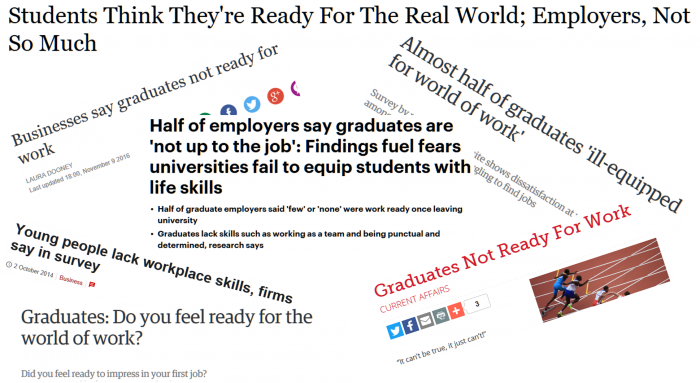Enough talking. It's time for action!
For years now the headlines have shouted out that young people and graduates are not ready for the world of work.
Don’t they listen?
Enough talking. It’s time for action.
Our educational institutions absolutely do listen and act.
So why isn’t this working?
Because, as good as it may be, this is no substitute for the real thing!
Before I explain further, let’s consider the scenario of learning a foreign language.
After he completed an extensive 6-month language course, he commenced work.
There is no substitute for application in a real world context.
So, why do we as employers have such high expectations of our educational institutions to make young people proficient in employability skills?
I am a volunteer business adviser for the Young Enterprise programme at a local secondary school working with Year 12 students to develop a profitable business. Young Enterprise has inspired approximately 4 million young people to discover and reach their potential over the past 50 years. It focuses on developing key employability skills in young people by supporting them to create a real business in a competitive environment. As an adviser, I am explicitly helping them to develop employability skills that I continually highlight to them, and explain the importance of these in the workplace.
According to their website, last year Young Enterprise helped approximately 340,000 young people aged 4 to 25 years old. There are approximately 16 million young people in this age range in the UK.
Young Enterprise is excellent but only reaches 2%
of its potential audience each year.
That’s 1 in 50. Of course, there are other programmes and initiatives taking place throughout our education system, however if Young Enterprise – the largest of them – is anything to go by, then together they are only ‘scratching the surface’.
It is our responsibility as employers to ‘take up the baton’ and develop essential business skills in our young employees during their first year in our employ.
Essential business skills are:
- Personal management
- Interpersonal behaviour (emotional intelligence)
- Communication skills
- Team working
- Problem solving
- Management
- Leadership
- Industry intelligence
- Customer awareness
- Financial awareness
The most effective place for young employees to learn them is while in employment and consolidate them in the workplace.
That’s been my experience of young employees attending the
GradStart® programme.
There is a well-known learning model called 70:20:10. 70% is learned and developed through experience; 20% from colleagues and mentors; 10% on formal courses.
Providing your young employees with a formal ‘graduate-style’ development programme is an excellent way of helping them to learn and understand core business skills and terminology.
In the workplace, they will apply what they’ve learned on a daily basis, so that within a relatively short period of time, they will become proficient, productive and professional. Their colleagues and mentors will help them to understand the real world context when applying their new found skills.
It’s a win-win-win.
A win for the young employee; a win for their colleagues;
and a win for your organisation.
Here is a message I received recently from one of our GradStart® graduates:
“I do hope GradStart is a continuing success?
Things at [their organisation] have gone from strength to strength. I'm now part of the Technical Project Team which coordinates all our projects and enjoying every single minute.”
You don’t have to be a large employer with an HR/L&D department, expertise, space or deep pockets to provide one, as you can outsource the formal component of essential business skills development for your young employees.
GradStart® is one such programme designed for SMEs.
So it’s time for us, as employers, to stop making the headlines, and start doing more to develop the business skills of our young employees so that they can lay down a solid foundation on which to build their career, and achieve their potential.
Enough talking. It’s time for action.
It’s the right thing to do.


